AR
-
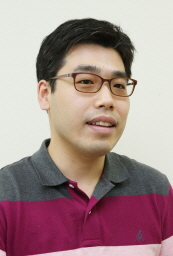 KAIST's graduate, the first Ph.D. holder in games, is appointed professor at Michigan State University in East Lansing
Dr. Tae-Woo Park
The academic community recognizes the study in games as a field for research
Dr. Tae-Woo Park, a graduate of KAIST, has been appointed a professor at Michigan State University (MSU) in East Lansing. He will start working in August at the Department of Telecommunications, Information Studies, and Media, the College of Communications Arts, MSU.
Dr. Park received a doctoral degree in games, the first of its kind in KAIST. His research focus is game design, research, and development.
Dr. Park has strived to enhance user experience by incorporating various aspects of everyday life into games and made efforts to introduce measures limiting or preventing game addiction, a major concern among young people in South Korea. Professor Joon-Hwa Song of Computer Science at KAIST, Dr. Park's advisor, commented that "KAIST graduates have been the main actors in the development of Korea's gaming industry. Our efforts to systemize the field of games into an academic discipline have been recognized through Dr. Park's appointment."
Dr. Park said that he plans "to apply mobile device and ubiquitous technology and develop games that will not only entertain users but also help them have a better life.”
2014.05.29 View 11335
KAIST's graduate, the first Ph.D. holder in games, is appointed professor at Michigan State University in East Lansing
Dr. Tae-Woo Park
The academic community recognizes the study in games as a field for research
Dr. Tae-Woo Park, a graduate of KAIST, has been appointed a professor at Michigan State University (MSU) in East Lansing. He will start working in August at the Department of Telecommunications, Information Studies, and Media, the College of Communications Arts, MSU.
Dr. Park received a doctoral degree in games, the first of its kind in KAIST. His research focus is game design, research, and development.
Dr. Park has strived to enhance user experience by incorporating various aspects of everyday life into games and made efforts to introduce measures limiting or preventing game addiction, a major concern among young people in South Korea. Professor Joon-Hwa Song of Computer Science at KAIST, Dr. Park's advisor, commented that "KAIST graduates have been the main actors in the development of Korea's gaming industry. Our efforts to systemize the field of games into an academic discipline have been recognized through Dr. Park's appointment."
Dr. Park said that he plans "to apply mobile device and ubiquitous technology and develop games that will not only entertain users but also help them have a better life.”
2014.05.29 View 11335 -
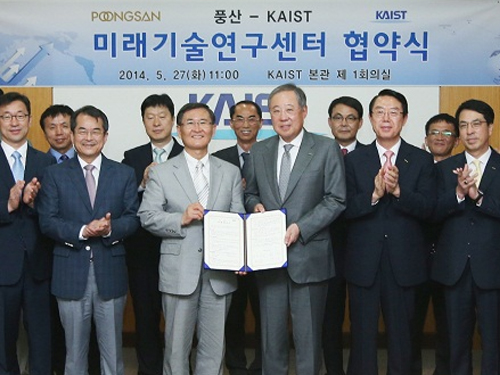 Establishment Agreement for KAIST-Poongsan Future Technology Research Center
KAIST and Poongsan Corporation agreed to found the KAIST-Poongsan Future Technology Research Center and held a ceremony to sign a memorandum of understanding in front of 30 attendees including KAIST President Steve Kang and Poongsan Chairman Jin Ryu on May 27 at KAIST.
The Research Center will develop basic technology in the fields of defense and high tech materials as well as build a new foundation for future Poongsan projects. Research areas include technologies for new materials, propulsion control, and defense.
To further this endeavor, Poongsan Corporation will support the KAIST-Poongsan Future Technology Research Center for 3 years through an investment of USD 2.95 million, personnel, and technology.
An agreement was made between KAIST and Poongsan to establish the Future Technology Research Center.
2014.05.29 View 7974
Establishment Agreement for KAIST-Poongsan Future Technology Research Center
KAIST and Poongsan Corporation agreed to found the KAIST-Poongsan Future Technology Research Center and held a ceremony to sign a memorandum of understanding in front of 30 attendees including KAIST President Steve Kang and Poongsan Chairman Jin Ryu on May 27 at KAIST.
The Research Center will develop basic technology in the fields of defense and high tech materials as well as build a new foundation for future Poongsan projects. Research areas include technologies for new materials, propulsion control, and defense.
To further this endeavor, Poongsan Corporation will support the KAIST-Poongsan Future Technology Research Center for 3 years through an investment of USD 2.95 million, personnel, and technology.
An agreement was made between KAIST and Poongsan to establish the Future Technology Research Center.
2014.05.29 View 7974 -
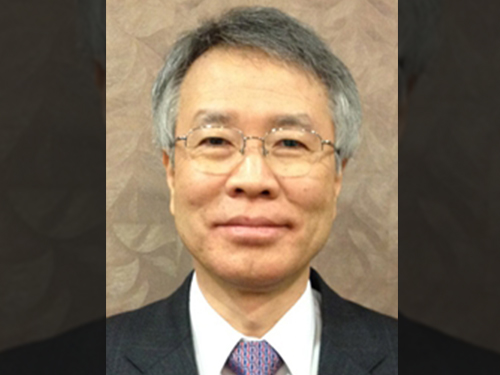 Professor Kyu-Young Whang receives the PAKDD Distinguished Contributions Award
Professor Kyu-Young Whag
Dr. Kyu-Young Whang, Distinguished Professor from the Department of Computer Science, KAIST, has received the 2014 Distinguished Contributions Award from the Pacific-Asia Conference on Knowledge Discovery and Data Mining (PAKDD). PAKDD is the leading academic international conference on data mining held in Asia/Pacific. This year’s international conference was held from 13th to 15th May at Tainan, Taiwan.
As a life member of the PAKDD Steering Committee, Professor Whang worked for the development of the data mining field in the Asia-Pacific region, and his contribution to the international database and data-mining field has been widely recognized.
The PAKDD Distinguished Contributions Award has been awarded to a total of six people until now, including Professor Whang, and he is the first Korean to receive this award.
Professor Whang has also a history of receiving the Outstanding Contributions Award in 2011 from the Database Systems for Advanced Applications (DASFAA), the prestigious database academic conference in the Asia-Pacific region. The database and data mining field in the region was barren 20 years ago, but through the efforts and contributions of many researchers, including Professor Whang, it has now leapt to the level of being the equal of North American and European researchers.
In fact, three academic organizations in the current international database field are led by professors in the Asia-Pacific region. The IEEE ICDE (Institute of Electrical and Electronics Engineers Technical Committee on Data Engineering) is led by Professor Whang; the VLDB (Very Large Data Base) Endowment by Professor Beng Chin Ooi from National University of Singapore (NUS); and the ACM SIGMOD (Association for Computing Machinery Special Interest Group on Management of Data) by Professor Don Kossmann from ETH Zurich.
2014.05.26 View 8910
Professor Kyu-Young Whang receives the PAKDD Distinguished Contributions Award
Professor Kyu-Young Whag
Dr. Kyu-Young Whang, Distinguished Professor from the Department of Computer Science, KAIST, has received the 2014 Distinguished Contributions Award from the Pacific-Asia Conference on Knowledge Discovery and Data Mining (PAKDD). PAKDD is the leading academic international conference on data mining held in Asia/Pacific. This year’s international conference was held from 13th to 15th May at Tainan, Taiwan.
As a life member of the PAKDD Steering Committee, Professor Whang worked for the development of the data mining field in the Asia-Pacific region, and his contribution to the international database and data-mining field has been widely recognized.
The PAKDD Distinguished Contributions Award has been awarded to a total of six people until now, including Professor Whang, and he is the first Korean to receive this award.
Professor Whang has also a history of receiving the Outstanding Contributions Award in 2011 from the Database Systems for Advanced Applications (DASFAA), the prestigious database academic conference in the Asia-Pacific region. The database and data mining field in the region was barren 20 years ago, but through the efforts and contributions of many researchers, including Professor Whang, it has now leapt to the level of being the equal of North American and European researchers.
In fact, three academic organizations in the current international database field are led by professors in the Asia-Pacific region. The IEEE ICDE (Institute of Electrical and Electronics Engineers Technical Committee on Data Engineering) is led by Professor Whang; the VLDB (Very Large Data Base) Endowment by Professor Beng Chin Ooi from National University of Singapore (NUS); and the ACM SIGMOD (Association for Computing Machinery Special Interest Group on Management of Data) by Professor Don Kossmann from ETH Zurich.
2014.05.26 View 8910 -
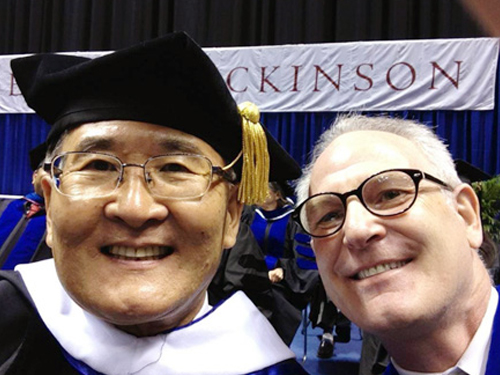 President Steve Kang Received an Honorary Degree from Fairleigh Dickinson University
At its 71st Commencement held on May 20, 2014, Fairleigh Dickinson University (FDU) in Teaneck, NJ, conferred an honorary doctorate (Doctor of Science) on President Steve Kang. FDU is President Kang’s alma mater. He received a bachelor’s degree from FDU in electrical engineering in 1970.
For details, please refer to the press statement released by FDU on May 20, 2014.
Fairleigh Dickinson University holds 71st Commencement on May 20
During the Commencement ceremony, the University will confer honorary degrees on Joyce Carol Oates, Rachel Robinson, and Sung Mo “Steve” Kang (BSEE’70).
http://inside.fdu.edu/prpt/71st_commencement.html
2014.05.25 View 7820
President Steve Kang Received an Honorary Degree from Fairleigh Dickinson University
At its 71st Commencement held on May 20, 2014, Fairleigh Dickinson University (FDU) in Teaneck, NJ, conferred an honorary doctorate (Doctor of Science) on President Steve Kang. FDU is President Kang’s alma mater. He received a bachelor’s degree from FDU in electrical engineering in 1970.
For details, please refer to the press statement released by FDU on May 20, 2014.
Fairleigh Dickinson University holds 71st Commencement on May 20
During the Commencement ceremony, the University will confer honorary degrees on Joyce Carol Oates, Rachel Robinson, and Sung Mo “Steve” Kang (BSEE’70).
http://inside.fdu.edu/prpt/71st_commencement.html
2014.05.25 View 7820 -
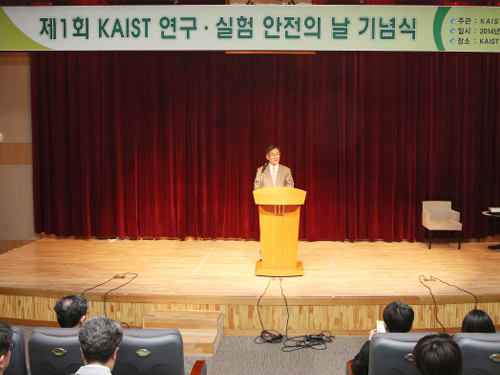 KAIST Conducts Safety Awareness Campaign for Research and Experiment
KAIST had an opening ceremony to hold its first “Safety Awareness Campaign for Research and Experiment” on 13th May. Over 100 people attended the ceremony, including President Steve Kang, Provost Gyu-Ho Park, and the Dean of the Administration Office Jae-Nam Lee, as well as the Chief of the Department of Research Environment Safety from the Ministry of Science, ICT and Future Planning, Republic of Korea.
On the day of the event, Year 2014 was proclaimed as the first year of accident-free KAIST research and laboratory facilities.
A certificate of merit was awarded to promote safe and comfortable research environments. The Department of Civil and Environmental Engineering, KAIST, was selected as the department with the best lab safety management and the Department of Mechanical Engineering as the second.
Along with the merit award ceremony, the results of the “7th Research and Laboratory Safety Campaign Contest” were announced: “Lady First When Dating, Safety First When Experimenting!” written by Jong-Su Bae from the Department of Mechanical Engineering was selected as the best slogan, and Hyeon-Chae Noh from the Department of Civil and Environmental Engineering received the award for best poster.
President Steve Kang said, “KAIST is constantly striving to establish a comprehensive safety management system and to promote a safe research and laboratory environment,” and “To ensure the safety of KAIST and its members, we will be as supportive as possible.”
Below is the winner of the poster from the 7th Research and Laboratory Safety Campaign Contest.
What Would You Rather Wear? Gloves or Bandages?
Gloves worn in laboratories are protection from hazardous materials that students and researchers may come in contact with. The poster emphasizes the importance of wearing protective gloves when conducting research or experiment.
2014.05.19 View 8291
KAIST Conducts Safety Awareness Campaign for Research and Experiment
KAIST had an opening ceremony to hold its first “Safety Awareness Campaign for Research and Experiment” on 13th May. Over 100 people attended the ceremony, including President Steve Kang, Provost Gyu-Ho Park, and the Dean of the Administration Office Jae-Nam Lee, as well as the Chief of the Department of Research Environment Safety from the Ministry of Science, ICT and Future Planning, Republic of Korea.
On the day of the event, Year 2014 was proclaimed as the first year of accident-free KAIST research and laboratory facilities.
A certificate of merit was awarded to promote safe and comfortable research environments. The Department of Civil and Environmental Engineering, KAIST, was selected as the department with the best lab safety management and the Department of Mechanical Engineering as the second.
Along with the merit award ceremony, the results of the “7th Research and Laboratory Safety Campaign Contest” were announced: “Lady First When Dating, Safety First When Experimenting!” written by Jong-Su Bae from the Department of Mechanical Engineering was selected as the best slogan, and Hyeon-Chae Noh from the Department of Civil and Environmental Engineering received the award for best poster.
President Steve Kang said, “KAIST is constantly striving to establish a comprehensive safety management system and to promote a safe research and laboratory environment,” and “To ensure the safety of KAIST and its members, we will be as supportive as possible.”
Below is the winner of the poster from the 7th Research and Laboratory Safety Campaign Contest.
What Would You Rather Wear? Gloves or Bandages?
Gloves worn in laboratories are protection from hazardous materials that students and researchers may come in contact with. The poster emphasizes the importance of wearing protective gloves when conducting research or experiment.
2014.05.19 View 8291 -
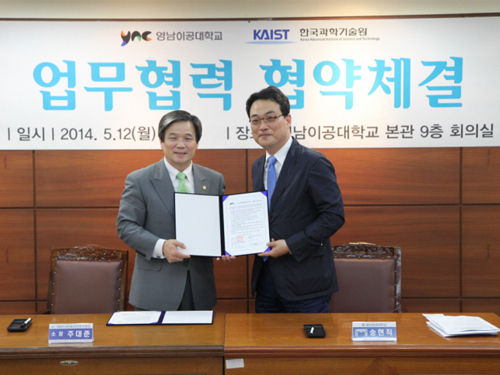 Cyber Security MOU between KAIST and Yeungnam University College (YNC)
The KAIST Cyber Security Research Center and the Department of Cyber Security at Yeungnam University College (YNC) signed a memorandum of understating (MOU) on May 12, 2014 at the YNC campus to cooperate in cyber security education and technological development.
In the MOU, KAIST and YNC agreed to collaborate for the training of professional personnel and the development of new technology for the strengthening of national cyber security, as well as the common use of mutual research environments and group participation of core tasks.
As a result of the MOU interaction, the KAIST Cyber Security Research Center and the Department of Cyber Security at YNC will pursue mutual development through the joint management of the latest educational training programs for cyber security and information protection and the development of up-to-date security technology suited for nuclear energy infrastructures and regional electronic industry complexes. They will also hold joint research seminars and forums.
The Director of the Cyber Security Research Center, Professor Dae-Joon Joo (KAIST Graduate School of Information Security) commented, “With a great deal of experience in the field of cyber security, KAIST, and its excellence in education and research areas, will contribute in many ways, such as increasing the supply of expert cyber-security personnel in the Daegu-Kyungbuk region and actively participate toward greater national cyber security through this collaboration agreement.”
[Picture]
Dae-Jun Joo, KAIST Cyber Security Research Center Director (Left) and Hyun-Jig Song (Right), Chief of Industry-Academic Cooperation Foundation at Yeungnam University College, pose after signing the cooperation agreement on cyber security.
2014.05.17 View 9427
Cyber Security MOU between KAIST and Yeungnam University College (YNC)
The KAIST Cyber Security Research Center and the Department of Cyber Security at Yeungnam University College (YNC) signed a memorandum of understating (MOU) on May 12, 2014 at the YNC campus to cooperate in cyber security education and technological development.
In the MOU, KAIST and YNC agreed to collaborate for the training of professional personnel and the development of new technology for the strengthening of national cyber security, as well as the common use of mutual research environments and group participation of core tasks.
As a result of the MOU interaction, the KAIST Cyber Security Research Center and the Department of Cyber Security at YNC will pursue mutual development through the joint management of the latest educational training programs for cyber security and information protection and the development of up-to-date security technology suited for nuclear energy infrastructures and regional electronic industry complexes. They will also hold joint research seminars and forums.
The Director of the Cyber Security Research Center, Professor Dae-Joon Joo (KAIST Graduate School of Information Security) commented, “With a great deal of experience in the field of cyber security, KAIST, and its excellence in education and research areas, will contribute in many ways, such as increasing the supply of expert cyber-security personnel in the Daegu-Kyungbuk region and actively participate toward greater national cyber security through this collaboration agreement.”
[Picture]
Dae-Jun Joo, KAIST Cyber Security Research Center Director (Left) and Hyun-Jig Song (Right), Chief of Industry-Academic Cooperation Foundation at Yeungnam University College, pose after signing the cooperation agreement on cyber security.
2014.05.17 View 9427 -
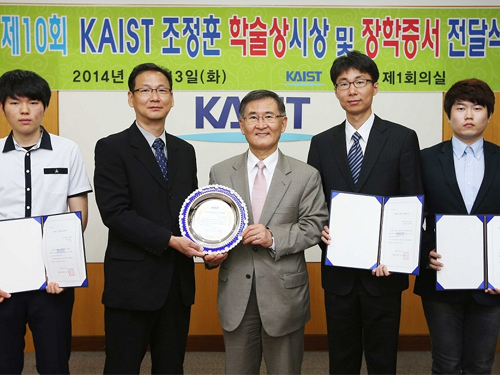 Dr. Sung-Gu Kim of KARI receives the 10th KAIST Jung-Hun Cho Academic Award
KAIST President Steve Kang awarded the 10th "KAIST Jung-Hun Cho Academic Award" to Dr. Sung-Gu Kim of Korea Aerospace Research Institute (KARI) along with Byeong-Sup Park, a graduate student of KAIST Aerospace Engineering, Hee-Won Chae of Korea University, and Jin-Hyung Noh of Kongju National University High School on May 13, 2014.
Dr. Sung-Gu Kim was recognized for his development of a 30-ton class reproduction cooling burner and the securing of essential factor technology for liquid-fuel rocket engines on the Naro project.
The KAIST Jung-Hun Cho Academic Award was established to commemorate Jung-Hun Cho who was killed while researching in the rocket laboratory on May 13, 2003. From 2005, young scientists from the Aerospace Engineering field have been recognized every year. One student each from KAIST, Korea University, and Kongju National University High School, where the honorary doctorate Dr. Cho attended, has been chosen as a scholarship recipient.
The KAIST Jung-Hun Cho Academic Award was established with USD 460,000 in funds donated from Cho's family.
2014.05.17 View 9779
Dr. Sung-Gu Kim of KARI receives the 10th KAIST Jung-Hun Cho Academic Award
KAIST President Steve Kang awarded the 10th "KAIST Jung-Hun Cho Academic Award" to Dr. Sung-Gu Kim of Korea Aerospace Research Institute (KARI) along with Byeong-Sup Park, a graduate student of KAIST Aerospace Engineering, Hee-Won Chae of Korea University, and Jin-Hyung Noh of Kongju National University High School on May 13, 2014.
Dr. Sung-Gu Kim was recognized for his development of a 30-ton class reproduction cooling burner and the securing of essential factor technology for liquid-fuel rocket engines on the Naro project.
The KAIST Jung-Hun Cho Academic Award was established to commemorate Jung-Hun Cho who was killed while researching in the rocket laboratory on May 13, 2003. From 2005, young scientists from the Aerospace Engineering field have been recognized every year. One student each from KAIST, Korea University, and Kongju National University High School, where the honorary doctorate Dr. Cho attended, has been chosen as a scholarship recipient.
The KAIST Jung-Hun Cho Academic Award was established with USD 460,000 in funds donated from Cho's family.
2014.05.17 View 9779 -
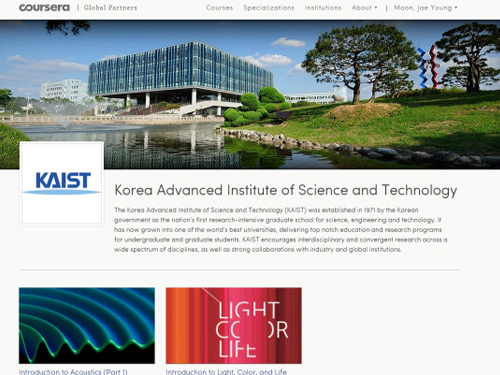 KAIST Offers Massive Open Online Courses (MOOCs) to Global Learners
Global learners can now take premier engineering courses offered by the Korea Advanced Institute of Science and Technology (KAIST) through one of the leading online education providers, Coursera.
KAIST has begun offering three massive open online courses (MOOCs) to reach millions of students on the Internet. Collaborating with Coursera to provide a MOOC platform, KAIST will extend its excellence in science and engineering to a broader global audience while using technology to enhance the classroom experience for its students on campus.
Three courses are offered in the following areas: sound engineering (as of May 12th); an interdisciplinary approach of physics, life science, and industrial design (to be launched in late May); and business management (to be launched in June).
Professor Yang-Hann Kim of Mechanical Engineering, an instructor who will teach the “Introduction to Acoustics” course, explained his decision to participate in MOOCs:
“I have been teaching acoustics engineering at KAIST over the past 30 years. I wanted to share my knowledge and expertise with researchers and students who are otherwise unable to receive a quality education in a traditional education setting. This is a great opportunity to offer my talent to the global community.”
The Center for Excellence in Learning & Teaching at KAIST has worked with professors to design online courses, record video lectures, and create student assignments. Students will learn in 10- to 15-minute lesson segments over a ten-week period, with an anticipated workload of 4-6 hours per week, on average.
KAIST made a partnership agreement with Coursera in October 2013 to provide free online courses for Korean and global learners. Beginning with three courses, the university plans to increase the number of classes incrementally.
To get more information about KAIST’s MOOC offerings, please visit https://www.coursera.org/kaist.
Founded by two computer science professors at Stanford University in 2012, Coursera offers free online education to anyone interested in learning and equipped with the Internet, including students, professionals, and life-long learners, to empower them with knowledge and skills. As of April 2014, Coursera has 7.1 million users in 641 courses from 108 institutions.
2014.05.14 View 9997
KAIST Offers Massive Open Online Courses (MOOCs) to Global Learners
Global learners can now take premier engineering courses offered by the Korea Advanced Institute of Science and Technology (KAIST) through one of the leading online education providers, Coursera.
KAIST has begun offering three massive open online courses (MOOCs) to reach millions of students on the Internet. Collaborating with Coursera to provide a MOOC platform, KAIST will extend its excellence in science and engineering to a broader global audience while using technology to enhance the classroom experience for its students on campus.
Three courses are offered in the following areas: sound engineering (as of May 12th); an interdisciplinary approach of physics, life science, and industrial design (to be launched in late May); and business management (to be launched in June).
Professor Yang-Hann Kim of Mechanical Engineering, an instructor who will teach the “Introduction to Acoustics” course, explained his decision to participate in MOOCs:
“I have been teaching acoustics engineering at KAIST over the past 30 years. I wanted to share my knowledge and expertise with researchers and students who are otherwise unable to receive a quality education in a traditional education setting. This is a great opportunity to offer my talent to the global community.”
The Center for Excellence in Learning & Teaching at KAIST has worked with professors to design online courses, record video lectures, and create student assignments. Students will learn in 10- to 15-minute lesson segments over a ten-week period, with an anticipated workload of 4-6 hours per week, on average.
KAIST made a partnership agreement with Coursera in October 2013 to provide free online courses for Korean and global learners. Beginning with three courses, the university plans to increase the number of classes incrementally.
To get more information about KAIST’s MOOC offerings, please visit https://www.coursera.org/kaist.
Founded by two computer science professors at Stanford University in 2012, Coursera offers free online education to anyone interested in learning and equipped with the Internet, including students, professionals, and life-long learners, to empower them with knowledge and skills. As of April 2014, Coursera has 7.1 million users in 641 courses from 108 institutions.
2014.05.14 View 9997 -
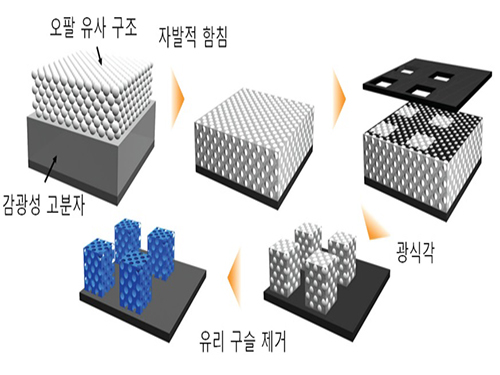 Clear Display Technology Under Sunlight Developed
The late Professor Seung-Man Yang
The last paper of the late Professor Seung-Man Yang, who was a past master of colloids and fluid mechanics
Practical patterning technology of the next generation optical materials, photonic crystals
The mineral opal does not possess any pigments, but it appears colorful to our eyes. This is because only a particular wavelength is reflected due to the regular nano-structure of its surface. The material that causes selective reflection of the light is called photonic crystals.
The deceased Professor Seung-Man Yang and his research team from KAIST’s Chemical and Biomolecular Engineering Department ha ve developed micro-pattern technology using photolithographic process. This can accelerate the commercialization of photonic crystals, which is hailed as the next generation optics material.
The research results were published in the April 16th edition of Advanced Materials, known as the most prestigious world-renowned journal in the field of materials science.
The newly developed photonic crystal micro-pattern could be used as a core material for the next generation reflective display that is clearly visible even under sunlight. Since it does not require a separate light source, a single charge is enough to last for several days.
Until now, many scientists have endeavored to make photonic crystals artificially, however, most were produced in a lump and therefore lacked efficiency. Also, the low mechanical stability of the formed structure prevented from commercialization.
In order to solve these problems, the research team has copied the nano-structure of opals.
Glass beads were arranged in the same nano-structure as the opal on top of the photoresist material undergoing photocuring by ultraviolet light. The glass beads were installed in the photoresist materials, and UV light was selectively exposed on micro regions. The remaining region was developed by photolithographic process to successfully produce photonic crystals in micro-patterns.
The co-author of the research, KAIST Chemical and Biomolecular Engineering Department’s Professor Sin-Hyeon Kim, said, “Combining the semiconductor process technology with photonic crystal pattern technology can secure the practical applications for photonic crystals.”He also predicted “This technology can be used as the key optical material that configures the next generation reflective color display device with very low power consumption.”
The late Professor Seung-Man Yang was a world-renowned expert in the field of colloids and fluid mechanics. Professor Yang published over 193 papers in international journals and continued his research until his passing in last September.
He received Du Pont Science and Technology Award in 2007, KAIST Person of the Year 2008, Gyeong-Am Academy Award in 2009, as well as the President’s Award of the Republic of Korea in March 2014. The researchers devoted the achievement of this year’s research to Professor Yang in his honor.
Research was conducted by KAIST Photonic-fluidic Integrated Devices Research Team, as a part of the Creative Research Program funded by the Ministry of Science, ICT and Future Planning, Republic of Korea.
Figure 1. Opal [left] and the nano glass bead arrangement structure within the opal [right]
Figure 2. Process chart of the photonic crystal micro-pattern formation based on photolithography
Figure 3. Opal structure [left] and inverted structure of the opal [right]
Figure 4. Photonic crystal micro-pattern in solid colors
Figure 5. Photonic crystal micro-pattern that reflects two different crystals (Red, Green) [left] and pixelated pattern of photonic crystal in three primary colors (Red, Green, Blue) [right] that is applicable to reflective displays
2014.05.14 View 12571
Clear Display Technology Under Sunlight Developed
The late Professor Seung-Man Yang
The last paper of the late Professor Seung-Man Yang, who was a past master of colloids and fluid mechanics
Practical patterning technology of the next generation optical materials, photonic crystals
The mineral opal does not possess any pigments, but it appears colorful to our eyes. This is because only a particular wavelength is reflected due to the regular nano-structure of its surface. The material that causes selective reflection of the light is called photonic crystals.
The deceased Professor Seung-Man Yang and his research team from KAIST’s Chemical and Biomolecular Engineering Department ha ve developed micro-pattern technology using photolithographic process. This can accelerate the commercialization of photonic crystals, which is hailed as the next generation optics material.
The research results were published in the April 16th edition of Advanced Materials, known as the most prestigious world-renowned journal in the field of materials science.
The newly developed photonic crystal micro-pattern could be used as a core material for the next generation reflective display that is clearly visible even under sunlight. Since it does not require a separate light source, a single charge is enough to last for several days.
Until now, many scientists have endeavored to make photonic crystals artificially, however, most were produced in a lump and therefore lacked efficiency. Also, the low mechanical stability of the formed structure prevented from commercialization.
In order to solve these problems, the research team has copied the nano-structure of opals.
Glass beads were arranged in the same nano-structure as the opal on top of the photoresist material undergoing photocuring by ultraviolet light. The glass beads were installed in the photoresist materials, and UV light was selectively exposed on micro regions. The remaining region was developed by photolithographic process to successfully produce photonic crystals in micro-patterns.
The co-author of the research, KAIST Chemical and Biomolecular Engineering Department’s Professor Sin-Hyeon Kim, said, “Combining the semiconductor process technology with photonic crystal pattern technology can secure the practical applications for photonic crystals.”He also predicted “This technology can be used as the key optical material that configures the next generation reflective color display device with very low power consumption.”
The late Professor Seung-Man Yang was a world-renowned expert in the field of colloids and fluid mechanics. Professor Yang published over 193 papers in international journals and continued his research until his passing in last September.
He received Du Pont Science and Technology Award in 2007, KAIST Person of the Year 2008, Gyeong-Am Academy Award in 2009, as well as the President’s Award of the Republic of Korea in March 2014. The researchers devoted the achievement of this year’s research to Professor Yang in his honor.
Research was conducted by KAIST Photonic-fluidic Integrated Devices Research Team, as a part of the Creative Research Program funded by the Ministry of Science, ICT and Future Planning, Republic of Korea.
Figure 1. Opal [left] and the nano glass bead arrangement structure within the opal [right]
Figure 2. Process chart of the photonic crystal micro-pattern formation based on photolithography
Figure 3. Opal structure [left] and inverted structure of the opal [right]
Figure 4. Photonic crystal micro-pattern in solid colors
Figure 5. Photonic crystal micro-pattern that reflects two different crystals (Red, Green) [left] and pixelated pattern of photonic crystal in three primary colors (Red, Green, Blue) [right] that is applicable to reflective displays
2014.05.14 View 12571 -
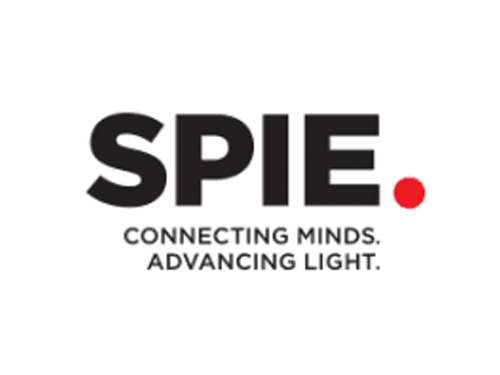 SPIE (The International Society for Optics and Photonics): Scattering Super-lens
The International Society for Optics and Photonics (SPIE), dedicated to advancing an interdisciplinary approach to the science and application of light, published online a short paper authored by a KAIST research team, Dr. Jung-Hoon Park and Professor YongKeun Park of Physics, introducing a new optical technology to observe sub-wavelength light by exploiting multiple light scattering in complex media.
For the article, please go to the link below:
SPIE: Nanotechnology
May 7th, 2014
"Scattering superlens" by Jung-Hoon Park and YongKeun Park
http://spie.org/x108298.xml
2014.05.14 View 7329
SPIE (The International Society for Optics and Photonics): Scattering Super-lens
The International Society for Optics and Photonics (SPIE), dedicated to advancing an interdisciplinary approach to the science and application of light, published online a short paper authored by a KAIST research team, Dr. Jung-Hoon Park and Professor YongKeun Park of Physics, introducing a new optical technology to observe sub-wavelength light by exploiting multiple light scattering in complex media.
For the article, please go to the link below:
SPIE: Nanotechnology
May 7th, 2014
"Scattering superlens" by Jung-Hoon Park and YongKeun Park
http://spie.org/x108298.xml
2014.05.14 View 7329 -
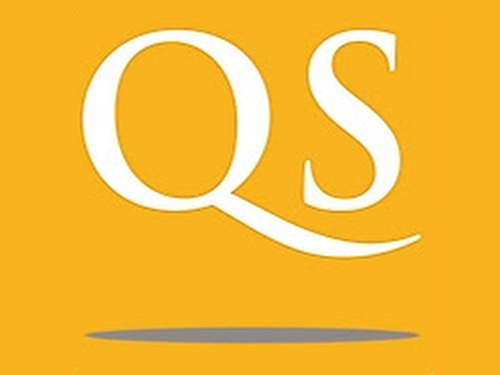 KAIST leaps to 2nd place in 2014 QS Asian University Rankings
The highest record ever made by a Korean university since the rankings were published in 2009
KAIST jumped four places to rank #2 from #6 last year, following the National University of Singapore
In the "2014 Quacquarelli Symonds (QS) University Rankings: Asia," KAIST advanced four places compared to 2013 and was ranked 2nd best university in Asia.
QS, an English institution for global university evaluation, and Chosun Newspaper, a leading daily newspaper in Korea, announced the results of the QS Asia University Rankings on April 12th. The result was a record high for a Korean University since the start of annual rankings in 2009.
KAIST has consistently ranked within the top ten, ranking 7th in 2009 and 2012, and 6th in 2013. The sudden jump from the 6th to the 2nd place was attributed to the increase in the number of published papers per professor and the number of citations per paper. In particular, KAIST received high marks for research contributions, which shows that the young faculty members hired since 2006 is now becoming very productive.
For details regarding the 2014 QS University Rankings: Asia, please visit
http://www.topuniversities.com/university-rankings-articles/asian-university-rankings/top-10-universities-asia-2014.
President Steve Kang of KAIST commented, “We are reaping the rewards of recruiting some of the most promising young professors. KAIST will continue its development towards becoming one of the top ten universities in the world.”
The QS Asia University Rankings have evaluated higher education institutions of Asia for the past six years. It evaluates 491 universities across 17 nations. Criterion for evaluation includes academic evaluation (30%), number of published papers per staff (15%), citation frequency (15%), number of students per staff (20%), alumni reputation, and internationalization (10%).
Please also refer to the Korean-American Science and Technology News (KASTN), dated June 4, 2014, for further information on the rankings.
Another Rankings, Pages 4-5
Chosun Ilbo, May 12, 2014
“Chosun-QS Rankings”
KAIST Soars to 2nd Place in Asian Rakings
http://www.phy.duke.edu/~myhan/b_14-12.pdf
2014.05.14 View 13480
KAIST leaps to 2nd place in 2014 QS Asian University Rankings
The highest record ever made by a Korean university since the rankings were published in 2009
KAIST jumped four places to rank #2 from #6 last year, following the National University of Singapore
In the "2014 Quacquarelli Symonds (QS) University Rankings: Asia," KAIST advanced four places compared to 2013 and was ranked 2nd best university in Asia.
QS, an English institution for global university evaluation, and Chosun Newspaper, a leading daily newspaper in Korea, announced the results of the QS Asia University Rankings on April 12th. The result was a record high for a Korean University since the start of annual rankings in 2009.
KAIST has consistently ranked within the top ten, ranking 7th in 2009 and 2012, and 6th in 2013. The sudden jump from the 6th to the 2nd place was attributed to the increase in the number of published papers per professor and the number of citations per paper. In particular, KAIST received high marks for research contributions, which shows that the young faculty members hired since 2006 is now becoming very productive.
For details regarding the 2014 QS University Rankings: Asia, please visit
http://www.topuniversities.com/university-rankings-articles/asian-university-rankings/top-10-universities-asia-2014.
President Steve Kang of KAIST commented, “We are reaping the rewards of recruiting some of the most promising young professors. KAIST will continue its development towards becoming one of the top ten universities in the world.”
The QS Asia University Rankings have evaluated higher education institutions of Asia for the past six years. It evaluates 491 universities across 17 nations. Criterion for evaluation includes academic evaluation (30%), number of published papers per staff (15%), citation frequency (15%), number of students per staff (20%), alumni reputation, and internationalization (10%).
Please also refer to the Korean-American Science and Technology News (KASTN), dated June 4, 2014, for further information on the rankings.
Another Rankings, Pages 4-5
Chosun Ilbo, May 12, 2014
“Chosun-QS Rankings”
KAIST Soars to 2nd Place in Asian Rakings
http://www.phy.duke.edu/~myhan/b_14-12.pdf
2014.05.14 View 13480 -
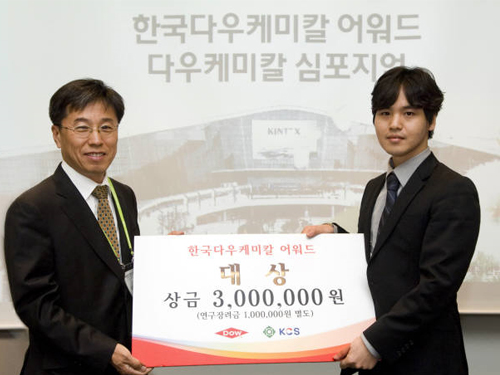 Yong-Joon Park, doctoral student, receives the Korea Dow Chemical Award 2014
Yong-Joon Park, a Ph.D. candidate of Materials Science and Engineering at KAIST, received the Korea Dow Chemical Award 2014, a prestigious recognition of the year’s best paper produced by students in the field of chemistry and materials science.
The award ceremony took place on April 18, 2014 at Ilsan Kintex, Republic of Korea.
The Korea Dow Chemical Award is annually given by Korea Dow Chemical and the Korean Chemical Society to outstanding papers produced by graduate and postdoc students. This year, a total of nine papers were selected out of 148 papers submitted.
The title of Park’s paper is “The Development of 3D Nano-structure-based New Concept Super-elastic Materials.” This material could be used in flexible electronic devices such as displays and wearable computers.
2014.05.03 View 8919
Yong-Joon Park, doctoral student, receives the Korea Dow Chemical Award 2014
Yong-Joon Park, a Ph.D. candidate of Materials Science and Engineering at KAIST, received the Korea Dow Chemical Award 2014, a prestigious recognition of the year’s best paper produced by students in the field of chemistry and materials science.
The award ceremony took place on April 18, 2014 at Ilsan Kintex, Republic of Korea.
The Korea Dow Chemical Award is annually given by Korea Dow Chemical and the Korean Chemical Society to outstanding papers produced by graduate and postdoc students. This year, a total of nine papers were selected out of 148 papers submitted.
The title of Park’s paper is “The Development of 3D Nano-structure-based New Concept Super-elastic Materials.” This material could be used in flexible electronic devices such as displays and wearable computers.
2014.05.03 View 8919